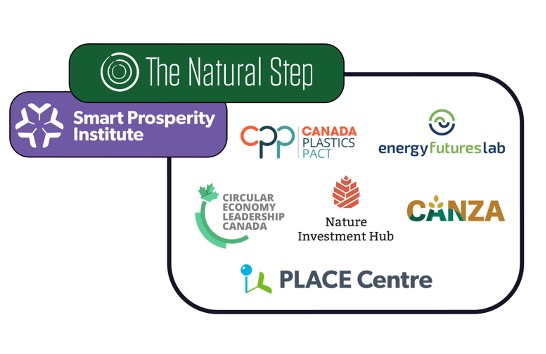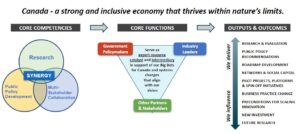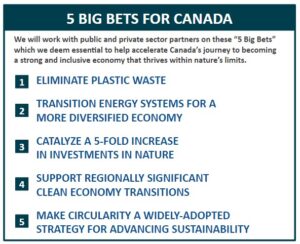The TNS-SPI Project to Build a Strategic Alliance to Support Canada’s Clean Economy Transition

Projects Sponsor
With their Next Step Canada Project, the two organisations put their heads together to get all hands on deck for the sustainable future.
In 2020, despite more than two decades of working to drive sustainability-focused systems change, The Natural Step Canada recognized that their lack of expertise in research, public policy development, and government relations was a barrier to increasing their impact. At the same time, the Smart Prosperity Institute — who excelled in those areas — felt they lacked the expertise and capacity to convene the kind of large action-oriented, innovation-focused change labs that could adequately engage industry and civil society actors alongside policymakers.

Having worked together on a number of projects, the two organisations determined that the best way forward was to achieve synergies between their different but complementary strengths. They came to the realisation that in order to get to where they needed to go, they needed to get together, and so they got to work.
After staff and the board of directors completed the initial research, more research involving interviewing and surveying internal staff and board members about the merits of the merger were conducted. Senior representatives from philanthropic foundations, corporate partners, and the Government of Canada who were aware of one or both organisations were consulted in order to understand the potential benefits, opportunities, and risks that might be associated with joining forces.

Efforts were made to identify other organisations in Canada and globally who might have forged similar alliances, or who could be exemplars or comparators for the potential partnership. As well, the potential of a “merger discount” – i.e. possible loss of revenue that might come from grantors who were currently funding both organisations, but who might not be able to do so if they combined forces, was analysed.
A Strengths, Weaknesses, Opportunities, and Threats analysis and a brand audit were conducted.
Two members of SPI’s board/steering committee were invited to join the TNS Canada Board of Directors and the board created the TNS-SP Partnership Planning Task Force – made up of staff, board, and an external consultant — to guide the work of the combined organisation going forward, and forward they’ve gone. Over a 6-month period the taskforce identified conditions that would have to be fulfilled to proceed with the alliance, developed a straw model of what the partnership might look like when fully advanced, and developed and oversaw a transition plan.
From there, a formal agreement that codified the terms and conditions of the partnership was negotiated, approved by the respective boards and committees, and was signed. A joint management team was created that combined together senior staff from SPI, TNS, and the various initiatives that operate as one team today.
Planning and governance across both organisations has improved and they’ve seen almost a tripling of combined revenues, leading to increased financial stability and a tripling of the number of staff, now 76 individuals.
The combined expertise, influence, and network of the two organisations mean that four new multi-stakeholder initiatives have been embarked upon. These include the Canada Plastics Pact (CPP), the Nature Investment Hub, the Canadian Alliance for Net-Zero Agri-food (CANZA), and the PLACE Centre.
These initiatives have brought in over one hundred new corporate partners which in turn has brought new resources and skill on board. The ability to co-host and contribute to new major events, including the World Circular Economy Forum, the first Canadian Circular Economy Summit, and the Canadian Net-Zero Industrial Strategy Summit were also direct benefits of the merger.

The two organisations’ goals of increasing their impact, better demonstrating their value proposition, achieving economies of scale, and increasing organisational capacity and resilience have been met. Perhaps more importantly, they set out to model and harness the benefits of the strategic solution-focused collaboration that’s essential for driving systems change at the intersection of the environment and the economy, and they’ve done that too.
Together The Natural Step Canada and the Smart Prosperity Institute serve as an effective catalyst and bridge between government, industry, academia, and civil society in ways that could advance sustainability-focused industrial strategy in a range of issue spaces. With the Next Step Canada Project, two forward-thinking organisations put their heads together to support Canada’s clean economy transition, then they put all hands on deck.
















